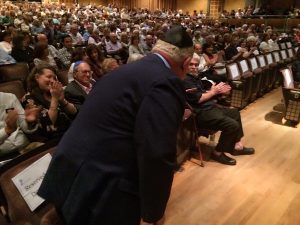Unlike many Jews who settled in London, Ont. in the 1920s, Charlie Burns did not have to resort to peddling or junk collection to eke out a living. Burns, his brother-in-law and a third (non-Jewish) partner ran a bootlegging operation that extended from Montreal to Vancouver. They imported liquor from Europe and smuggled it into the United States. Al Capone was said to be one of their biggest customers.
The partners bought a defunct brewery in Milwaukee, Wis., transported the machinery to London, and rebuilt the city’s Carling Brewery, which had been closed due to Prohibition. “They made a fortune,” the late London lawyer and judge Mayer Lerner once recalled.
READ: THE JEWISH BOOTLEGGERS OF MANITOBA
Burns and his wife, Tabella, were supposedly the wealthiest Jews in London in the ’20s. According to former London community leader Bernard Wolf, Burns had the first big Cadillac in town, then worth the astronomical sum of about $14,000. But they were also community minded – Burns built a Talmud Torah and Jewish Centre on London’s Hill Street, and Tabella helped organize an early Hadassah chapter.
Burns’ name appeared often in newspapers, especially after a probe into a potential tax evasion charge in 1927. He also made headlines with a grand publicity stunt when he put up $25,000 to attract a pilot for a daring non-stop flight from London, Ont., to London, England. Unlike Charles Lindbergh’s famous transatlantic flight, Burns’ proposed London-to-London trip ended disastrously in September 1927 when the plane was lost at sea.
That was not the only thing that would crash during the Burns’ short-lived career as liquor magnates and real estate entrepreneurs. In the late ’20s, Burns put up millions of dollars to build the landmark Dominion Square Building in Montreal. Then the Depression hit, costs got out of hand, and he went broke. Carling stock fell from $35 in January 1929 to only $5 in December of that year. He and his partners also lost a large property they were attempting to develop on Toronto’s Yonge Street, across from the newly built Eaton’s College Park.
“Overnight – literally overnight – they were out of business,” Lerner recalled.
Impoverished and a widower, Burns left London and spent his remaining years in California. Or at least that’s what I believed when I wrote my book, A History of the Jewish Community of London, Ontario from the 1850s to the Present Day (Now and Then Books). But earlier this year, I received a letter from one of Burns’ grandchildren advising me that there was much more to the story.
READ: BOOK CHRONICLES HISTORY OF LONDON, ONTARIO JEWS
My account of her grandfather, she wrote, “leaves out 40 years of life and living, a second marriage, parenting and grandparenting… he lived for years in Montreal, Detroit and Chicago before he moved to California in his old age with his second wife, Sara. They enjoyed a solidly middle class life.”
Burns had been born Shoyl Bershadsky in Odessa, she told me, and had also used the name Bernstein at one point. He had “an indomitable spirit and, in my mother’s words, ‘no matter what happened, he just kept going.’” He also had six children to care for after his wife died.
For a time, Burns worked behind the counter of a Montreal delicatessen. “To support himself and the dependent children,” she added, “Charles took whatever jobs he could during the hard years of the Depression. . . . He did his own housework as well as working. I still make his recipe for spaghetti sauce and make up beds as he did with an extra blanket folded accordion style at the foot of the bed.”
Burns married Sara in Chicago. He ultimately won a lawsuit launched over the land on which the Dominion Square Building was built, but not before it went all the way to the Privy Council on appeal. In his 70s, he and Sara moved to San Diego where he died in 1972. “He is survived by about 11 grandchildren, 10 great-grandchildren and at least two great-great grandsons who are growing up in Montreal,” my correspondent writes.
She added, “Reading your short section on my grandfather gives new meaning to my Uncle Milton’s joke: ‘I’m working on my second million – I’ve given up on the first.’”






